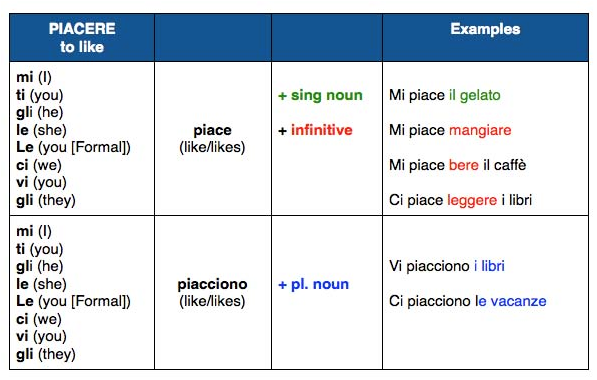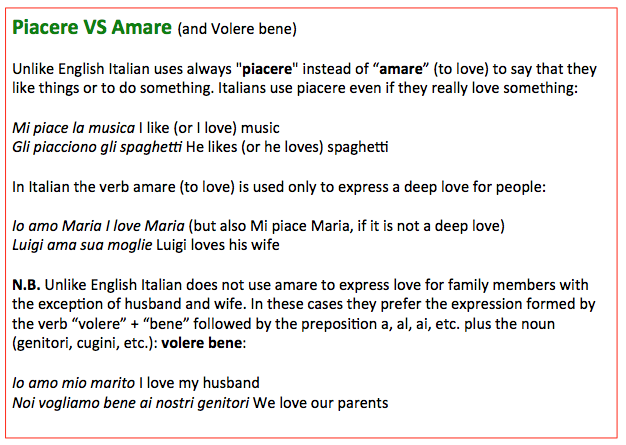Il verbo Piacere (The verb Piacere)
 Grammar
Grammar
 The verb piacere (to like) is used to express that you like something. Now the verb piacere works a little bit differently from most other Italian verbs so pay close attention. The verb is mostly used in the 3rd person singular or plural (piace and piacciono) and the person who has the feeling is expressed by an indirect object pronoun: mi (for I), ti (for you), gli (for he), le (for she), Le (for you formal), ci (for we), vi (for you all), gli (for they). See the chart and the table below:
The verb piacere (to like) is used to express that you like something. Now the verb piacere works a little bit differently from most other Italian verbs so pay close attention. The verb is mostly used in the 3rd person singular or plural (piace and piacciono) and the person who has the feeling is expressed by an indirect object pronoun: mi (for I), ti (for you), gli (for he), le (for she), Le (for you formal), ci (for we), vi (for you all), gli (for they). See the chart and the table below:
mi piace/mi piacciono = I like
ti piace/ti piacciono = you like (you singular)
gli piace/ gli piacciono = he likes
le piace/le piacciono = she likes
Le piace/Le piacciono = you like (you formal)
ci piace/ci piacciono = we like
vi piace/vi piacciono = you like (you plural)
gli piace/gli piacciono = they like
You may be asking yourself why in each case there are two options: piace and piacciono. Well, you use “piace” if whatever you like is singular and you use “piacciono” if whatever you like is plural. For example: you want to say in Italian “I like the book“. Now, “the book” is what “I like” and it is singular, so you will choose “mi piace”: Mi piace il libro = I like the book. If instead you want to say “I like the books“, you will pick “mi piacciono” because “books” is plural: Mi piacciono i libri = I like the books.
If you want to say that you like to do (to sing, to play, etc.) a particular activity, an infinitive verb must follow the verb piacere. In this case you always use the singular form piace: Ci piace nuotare = We like to swim; Ti piace mangiare gli spaghetti = You like to eat spaghetti.

You can also use piacere with a person’s name or nouns. In this case you don’t need to write the pronouns mi, ti, gli, le, etc. but place the preposition a in front of the name (Giovanni, Maria, etc.) or the articulated prepositions al, alla, allo, etc. in front of the noun (professore, bambina, studentessa, etc.): A Marco piace la pizza = Marco likes pizza; Al professore piacciono i film americani = Professor likes American movies; Agli italiani piace bere il caffè = Italians like to drink coffee.
The Negative form of Piacere
To make the statement negative (to say that you don’t like something, or you don’t like to do something) simply add non
- in front of the pronoun mi, ti, gli etc.: Non mi piace la carne; Non mi piacciono gli spaghetti; Non mi piace studiare la matematica;
- in front of piace/piacciono if you do not have a pronoun (mi, ti, gli, etc,) but a preposition (a, al, etc.) plus a name (Marco, John, etc.) or nouns (professore, studente, etc.): A Matteo non piace il pesce; Al professore non piacciono i film comici; Agli studenti non piace andare a scuola.

![]() Choose the correct form of the verb piacere (piace or piacciono) in the following sentences.
Choose the correct form of the verb piacere (piace or piacciono) in the following sentences. ![]()
Mi (piace/piacciono) gli spaghetti al pomodoro.
Ti (piace/piacciono) leggere?
A Mario (piace/piacciono) i racconti di Alberto Moravia.
Agli adulti (piace/piacciono) andare a teatro.
Non mi (piace/piacciono) il tuo carattere.
Agli amici di Marco (piace/piacciono) i film italiani.
Ti (piace/piacciono) i vini italiani?
Mi (piace/piacciono) molto la carne.
Non le (piace/piacciono) questo libro.
Ci (piace/piacciono) le lasagne della nonna.
![]() Read the following sentences introducing the correct form of the verb piacere (piace or piacciono).
Read the following sentences introducing the correct form of the verb piacere (piace or piacciono).![]()
Mi (?) la musica classica.
Ti (?) ballare?
Ci (?) i film americani.
Vi (?) studiare italiano?
A Gianni (?) ascoltare la musica.
Le (?) leggere romanzi?
Agli americani (?) l’Italia.
Gli (?) le arti visive.

![]() Listen to the dialogue between Marco and Rachel, and answer the following True and False questions.
Listen to the dialogue between Marco and Rachel, and answer the following True and False questions. ![]()
 A Rachel piace l’idea di andare al concerto di un cantante italiano. T, F
A Rachel piace l’idea di andare al concerto di un cantante italiano. T, F
A Marco piacciono solo (only) i cantanti americani. T, F
A Rachel piace molto l’arte, ma studia musica. T, F
Il concerto comincia alle 8:30. T, F
![]() Rewrite the following sentences replacing the verb amare with piacere.
Rewrite the following sentences replacing the verb amare with piacere. ![]()
Io amo viaggiare.
Lui ama andare al museo.
Loro amano ballare in discoteca.
Antonio ama la musica classica.
Voi amate mangiare bene.
Lei ama i dolci.
Noi amiamo le macchine sportive.
Rachel ama l’arte italiana.
Gli italiani amano il calcio.
Tu ami i quadri di Modigliani?
![]() Transform the following sentences in the negative form.
Transform the following sentences in the negative form. ![]()
Che cosa piace a Marco?
Mi piace molto la musica di Morricone.
La lingua italiana piace agli studenti americani.
Ci piace disegnare.
A Luigi piace la danza classica.
Ti piace andare a sciare in inverno?



2 Comments